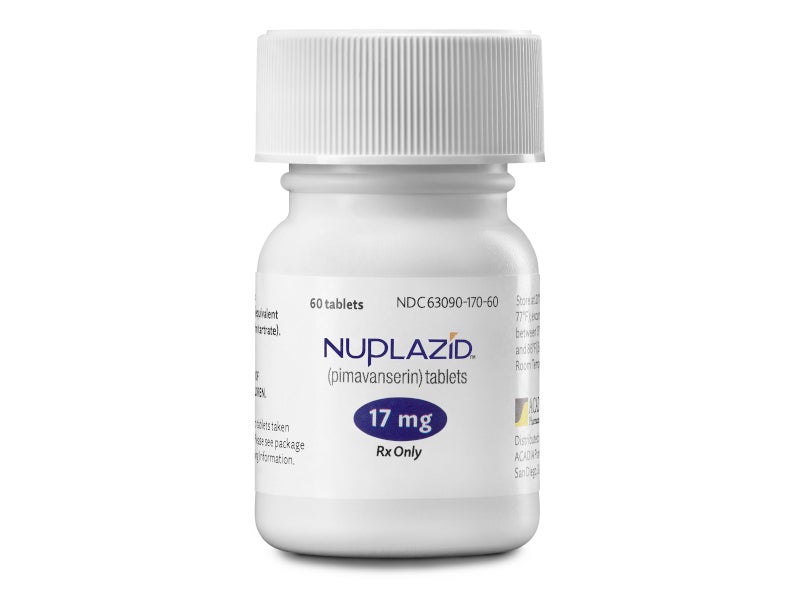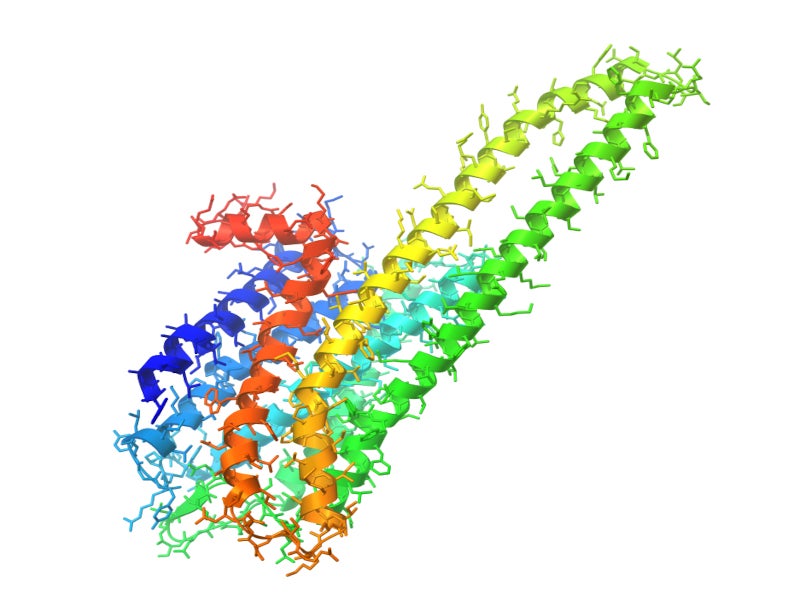Nuplazid (pimavanserin) is a serotonergic agent indicated for the treatment of delusions and hallucinations characteristic to psychosis in Parkinson’s disease (PDP).
Discovered and developed by Acadia Pharmaceuticals, the drug is a selective serotonin inverse antagonist (SSIA). It gained breakthrough therapy designation for the treatment of PDP from the US Food and Drug Administration (FDA) in 2014.
Nuplazid is available as round, white to off-white, coated oral tablets for immediate release in 17mg dosage strength.
Regulatory approvals for Nuplazid
In September 2015, Acadia submitted a new drug application (NDA) for Nuplazid to the FDA, which was then accepted and granted priority review status in November 2015. The FDA approved Nuplazid for the treatment of hallucinations and delusions associated with PDP patients in April 2016 and the drug was subsequently launched in the market in May 2016.
Acadia is also investigating pimavanserin for negative symptoms of schizophrenia.
Details of psychosis in Parkinson’s disease
Parkinson’s disease (PD) is an acute neurodegenerative disorder caused by the degeneration of neurons in the primary motor cortex or M1 region of the brain.
PDP is a debilitating disorder that occurs in around 40% of PD patients. It is characterised by hallucinations and delusions, which can be a burden to PD patients by affecting their quality of life.
According to estimates by the National Parkinson Foundation, around one million people in the US and between four and six million people worldwide are affected by PDP.
Nuplazid’s mechanism of action
Nuplazid contains a non-dopaminergic anti-psychotic drug that selectively targets and blocks 5-HT2A receptors, which play an important role in neuropsychiatric disorders, thus preventing psychosis symptoms associated with PD.
Parkinson’s therapies typically work to stimulate dopamine and treat motor symptoms such as tremors, muscle rigidity, and walking. Nuplazid does not interfere with dopaminergic therapy, since it has no binding affinity for dopamine receptors and does not bind to receptors targeted by antipsychotics. As a result, the therapy does not affect motor skills.
Clinical trials on Nuplazid
The FDA’s approval of Nuplazid was based on results from a six-week, double-blind, placebo-controlled Phase III clinical trial conducted between August 2010 and August 2012.
The study enrolled 199 PDP patients aged older than 40 years. Nuplazid was administered to 95 recipients, while 90 patients received placebo.
The primary outcome measure of the trial was anti-psychotic benefit, which was assessed by independent review using the Parkinson’s disease-adapted scale for assessment of positive symptoms (SAPS-PD).
Results from the study demonstrated that patients treated with Nuplazid showed statistical improvement on all primary and secondary efficacy endpoints, with no worsening of motor function. The study also showed that patients treated with Nuplazid were associated with a -5.79 decrease in SAPS-PD scores, compared with -2.73 for placebo.
Nuplazid showed a marked improvement in the number of hallucinations, delusions, secondary psychoses, and night-time sleep. The results were similar across all subgroups, indicating enhancement with Nuplazid over placebo regardless of sex, race, or age group.
Another open-label extension (OLE) clinical trial was conducted in 459 patients who had previously completed a double-blind, placebo-controlled study to evaluate the long-term safety and tolerability of Nuplazid, at a dose of 34mg once-daily.
The study demonstrated a favourable benefit and risk profile of the drug without any unexpected safety concerns. Mortality rates did not suggest any increased risk following long-term treatment.
The most common side effects of Nuplazid observed in the trials included leg swelling, nausea, and confusion.






